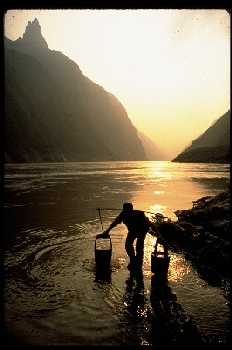China: Three Gorges Dam
|
 |
|
Dam Project Exposes Corruption, Power Struggle
|
Canada's Export Development Corporation has been involved in the Three Gorges Dam project, even when other world lending and credit institutions /banks wouldn't touch it because of the known violations which would be incurred. Canada's reputation for turning a blind eye to human rights abuses, environmental assessment, massive ecosystem violation, public health standards etc. is growing at an alarming rate. Be it big dams, bio genetic engineering, agressively fought for multilateral vested interest economic agreemnts over universal public trust agreements, unethical trade challenges through the WTO, whatever, profit before people seems to be the neo-Liberal, all American Canadian way !!
|
http://www.unfoundation.org/unwire/unwire.cfm#8
CHINA: Dam Project Exposes Corruption, Power StruggleChina has convicted 97 officials of corruption in connection with the expensive and contentious Three Gorges Dam project (BBC Online, 21 Jul), part of a far-reaching purge that could affect the leadership of the ruling communist party (Audrey Topping, Earth Times, 13 May). The Yangtze River project, the largest hydroelectric and flood control plan in the world, has been criticized for its cost, environmental risks, forced resettlement of local citizens and widespread corruption (BBC Online). In May, a coalition of 53 experts called on China to revamp the project (UN Wire, 3 May). In the six-year life of the Three Gorges Dam project, 140 cases of corruption involving billions of yuan and hundreds of officials have been uncovered (Vivien Pik-Kwan Chan, South China Morning Post, 9 Jun). The official investigation has sparked a charged debate in the politburo over the direction of the country's economy, splitting the country into hard-liners who favor the projects and reformers who oppose it. Chinese President Jiang Zemin has led the call for a full inquiry into allegations of corruption in connection with the dam. "No matter how high the office, anyone found guilty of graft will be pursued and brought to justice," he said. In a surprise move, he lifted all limits from the investigation and encouraged investigative reporters to follow the corruption trail wherever it led, even to the previously protected "inner sanctums" of the Ministry of State Security and dam committee of the state council (Topping, Earth Times). WB-commissioned report attacks value of big dam projectsFinancial Times (London) November 14, 2000, Tuesday London Edition 2 Report attacks value of big dam projectsBy ALAN BEATTIE NEW DELHI A report to be launched this week by an international commission of experts is sharply critical of large dams in developing countries, saying they often fail to deliver promised benefits and have large human and environmental costs. The report will delight environmental and development activists who have led a long campaign against large dams, such as the highly controversial Nar mada dam in western India and the Three Gorges river project in China. A draft of the overview to the report by the World Commission on Dams (WCD), seen by the Financial Times, says that large dams - of which there are more than 45,000 worldwide - generally fail to provide the promised irrigation benefits and frequently involve mass resettlement of poor people, with inadequate compensation. "In terms of the social impact of dams, the Commission found that the negative effects were frequently neither adequately assessed nor accounted for," the report says. "Given the large capital investment in large dams, the Commission was disturbed to find that substantive evaluations of completed projects are few in number, narrow in scope . . . and inadequately linked to decisions on operations." Some expect the full report - to be launched on Thursday by Nelson Mandela, the former South African president - to single out for criticism the World Bank, which has often been involved in funding large dams in developing countries. The WCD, which brought together environmental, engineering and development experts, was set up in 1998 after prompting by James Wolfensohn, the bank's president. The report is likely to diminish enthusiasm within the bank and other development agencies, including western governments' export credit guarantee departments, for backing large dam projects. The World Bank yesterday categorically denied local reports that Mr Wolfensohn, now on a nine-day tour of India, had praised the Narmada dam in the Indian state of Gujurat. The bank withdrew support from the dam in 1993 after a highly critical independent study. "We are well out of the Narmada dam and do not intend to get back in," said Edwin Lim, the Bank's India director. The bank said Mr Wolfensohn's comments were limited to telling the chief minister of Gujarat that if the project did have benefits, the government should make them clear to the public. The Gujarat state government last week requested a Dollars 317m (Pounds 222m) loan from the World Bank for supplying water from the Narmada project to 1,700 villages. Bank officials indicated that a loan for any project involving water from the Narmada was unlikely to be approved. |

